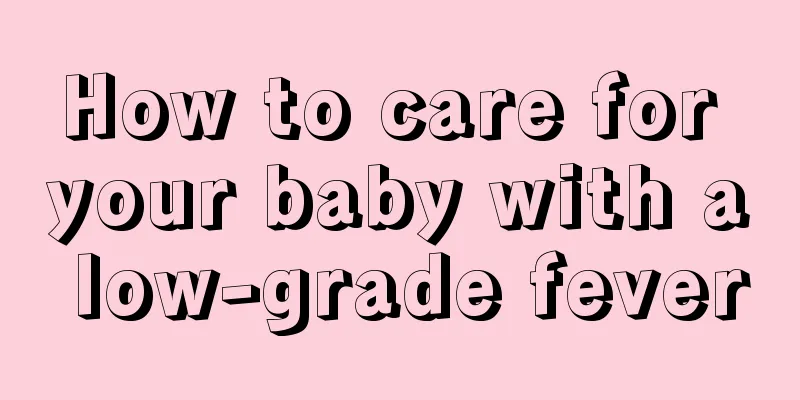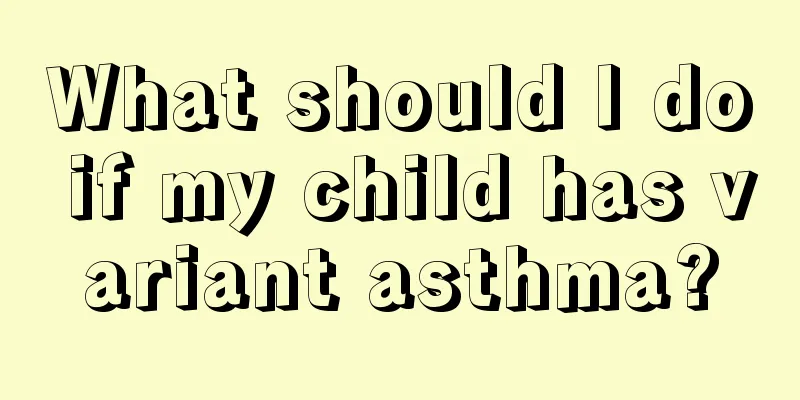How to care for your baby with a low-grade fever

|
Every parent hopes that their baby is healthy and will not get sick. However, due to the low immunity of children, they often get sick. For example, the baby has a low fever, which makes many parents very anxious. What should they do? 1. Stay hydrated Water is better than medicine. When you have a fever and sweat a lot, it is necessary to drink warm water frequently to replenish your body. For infants under six months old, continue to breastfeed. Breast milk is easy to digest, can meet nutritional needs, and replenish water. For artificial feeding, you can feed diluted whole milk, that is, 2 parts of milk powder plus 1 part of water (2:1). Although the baby's milk intake is reduced at this time, the water is supplemented, which is more conducive to the baby's digestion and absorption. It is advisable for young children to drink boiled water when they have a fever. They can be fed some boiled water appropriately to supplement the body's vitamin C and enhance disease resistance. Drink enough water to keep your lips moisturized, but don't drink too much. 2. Liquid diet For young children with fever, the diet should mainly consist of liquid food, such as milk, lotus root powder, milk (with less oil), etc. You can also drink some mung bean soup or ice watermelon to help cool down, promote diuresis and fight disease. However, for infants (under 6 months old) with diarrhea, who have poor resistance, weak gastric motility, and poor tolerance of gastric mucosa, cold drinks are not conducive to physical recovery and should be avoided. When the child's body temperature drops and his appetite improves, he can be fed semi-liquid food, such as minced meat porridge, noodles, rice porridge, egg drop porridge, and some easily digestible food (fish). The diet should be light and easily digestible, with less oil and salt, and small meals. Spicy and irritating foods should be avoided. But there is no need to avoid certain foods to prevent malnutrition and decreased resistance. 3. Take sugar and salt water If a young child has fever and diarrhea, the medicine can be taken multiple times. Take sugar and salt water. The preparation ratio is 500 ml of water, one teaspoon of sugar and half a bottle cap of salt. 500 ml can be taken within 4 hours. At the same time, you can supplement with electrolyte foods such as citrus, bananas and other fruits (high in potassium and sodium), milk and soy milk (containing calcium), rice soup, and pasta (containing zinc). For those with more severe symptoms, they should temporarily fast and receive intravenous drips to replenish water and electrolytes. After the diarrhea and vomiting are relieved, you can eat liquid food, such as rice soup, filtered vegetable juice, lotus root powder, etc., but you should avoid milk and soy milk (which can easily produce gas). Children with fever and cough should not eat too much to prevent vomiting. They should eat easily digestible food and less seafood and salty and greasy food to prevent allergies and coughing and aggravate symptoms. From the article, I learned that my baby has been having a low-grade fever. First of all, such a phenomenon should be treated by taking the child for timely examination and treatment, especially since the child’s illness will cause the child to have a continuous low-grade fever. But you should also pay more attention to the child in life to prevent the child from catching a cold. |
<<: What should you pay attention to in your baby's diet?
>>: What are the developmental indicators of a baby at ten months?
Recommend
What should children eat to be good for their eyes? Eat more of these foods
Eyes are very important, and eye problems can hav...
At what age does a baby need a teething stick?
From the moment babies are born, they are constan...
What to do if your baby has a hoarse voice and coughs
In fact, hoarseness and coughing in babies are ve...
What to do if premature babies have ventricular septal defect
Infants have many congenital diseases in their ea...
Can children eat watermelon when they have a cough?
Children’s physical health has always been a matt...
Why do children's teeth turn yellow?
I believe parents will devote all their energy to...
What is the normal height for a 15-year-old girl?
Women are generally shorter than boys because the...
What are the ways for young girls to enlarge their breasts?
The breast enhancement methods for adolescent gir...
How much milk does a newborn baby eat each time?
From the moment a baby is born, they have to face...
Why can't my two-year-old baby walk? Reveal the truth for you!
If a baby still cannot walk when he is two years ...
What should children eat if they don’t grow taller?
As parents, we all want our children to grow up h...
The child's lower lip suddenly swells
Children are in a critical period of physical dev...
What is the sleep time of a 70-day-old baby?
We all know that it is very important for newborn...
What's the best way to treat a newborn baby that keeps crying?
If the child is always crying, parents should fir...
What to check for dizziness in children
In our lives, many children often feel dizzy. In ...









